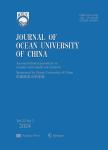Effect of Feeding Strategies on Molecular Responses of Biotransformation Genes in Crassostrea gigas Exposed to Cadmium
Effect of Feeding Strategies on Molecular Responses of Biotransformation Genes in Crassostrea gigas Exposed to Cadmium作者机构:Marine Biology Institute of Shandong Province Qingdao 266104 China College of Food Science and Engineering Ocean University of China Qingdao 266003 China
出 版 物:《Journal of Ocean University of China》 (中国海洋大学学报(英文版))
年 卷 期:2019年第18卷第4期
页 面:883-888页
核心收录:
学科分类:07[理学]
基 金:supported by the Earmarked Fund for Modern Agro-industry Technology Research System in Shandong Province (No. SDAIT-14) the major Agricultural Applied Technological Innovation Program in Shandong Province: Construction and Demonstration of Ecological Farming Model of Monomeric Triploid Oyster
主 题:cadmium metallothionein P-glycoprotein heat shock protein 70 Crassostrea gigas feeding strategies
摘 要:Heavy metals, including cadmium (Cd), are widespread pollutants of great environmental concern because of their ac- cumulation and toxicity. Environmental conditions can affect the accumulation and elimination of Cd in organisms. The aim of this study is to understand the respective responses of metallothioneins (MTs), P-glycoprotein (P-gp), and heat shock protein 70 (hsp70) genes in the mantle and digestive gland of the oyster Crassostrea gigas exposed to 10 g L 1 Cd for 28 days, followed by a depura- tion period of 35 days under different feeding strategies. The MT expression in the digestive gland was higher than in mantle, and was induced in a fluctuating pattern throughout the time of the whole experiment when the oyster was exposed to Cd. The results indicated an enhanced MT activity is required for Cd detoxification. Expression levels of P-gp in the mantle of Cd-exposed oysters fed with algae increased in the first two weeks of the accumulation phase. Then the induction weakened, but the expression still in- creased significantly compared with the control group fed without algae. The P-gp levels in the digestive gland were under-regulated during both the contamination and decontamination periods except in the group fed with Dicrateria inornata at day 0.083. The in- duction of P-gp is possibly related to the important role of pumping Cd out of the cell, while a major implication of P-gp expression inhibition would be a disruption of the protein synthesis. Hsp70 expression exhibited an overall decreasing trend. The highest relative hsp70 inhibition occurred during day 42 to day 63, with approximately 4-fold and 10-fold lower hsp70 levels as compared to the *** feeding with no algae in the mantle and digestive gland, respectively. The induction of hsp70 may be explained by the re- folding of protein in presence of Cd, followed by the inhibition of hsp70 when the protein synthesis was disrupted.



